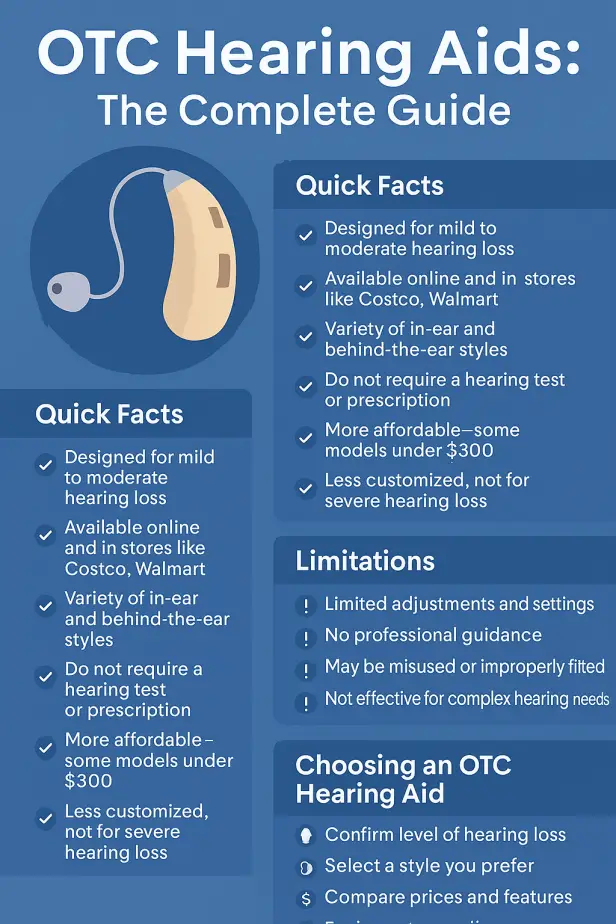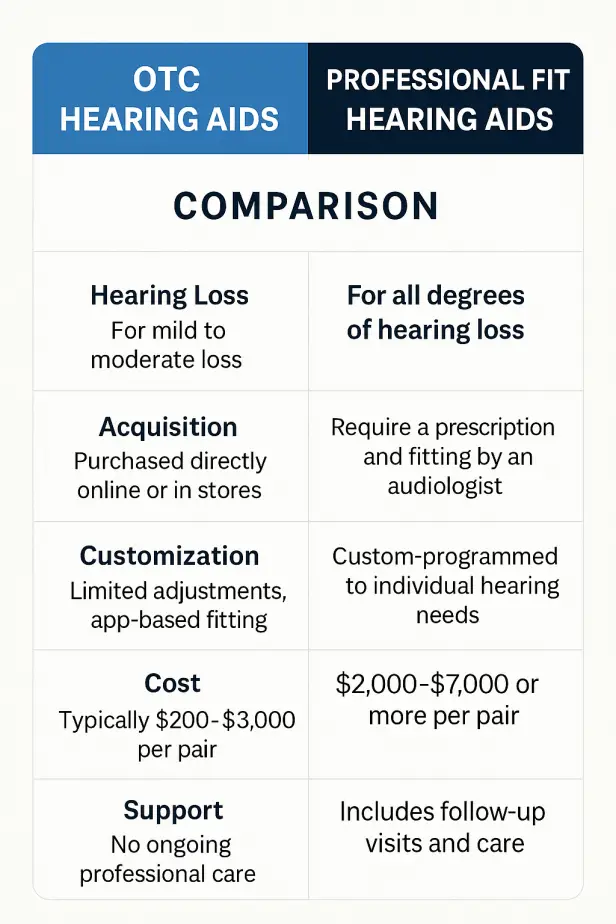Over-the-counter (OTC) hearing aids have transformed the landscape of hearing care. For the first time, adults with mild to moderate hearing loss can purchase hearing aids directly from a store or online — no prescription, no fitting appointment, and often for a fraction of the price of traditional hearing aids.
Since the FDA’s ruling in 2022, OTC devices have become widely available. You can now find them at Costco, Walmart, Best Buy, Walgreens, and directly from manufacturers.
As a clinical audiologist with over 12 years of experience, I’ve seen firsthand how OTC devices can benefit some patients — and also where they fall short. My view is this:
- OTC hearing aids are a good entry point for people with mild, stable hearing loss who want affordability and convenience.
- Professional fit hearing aids remain essential for people with greater than moderate hearing loss or for those in difficult listening situations (restaurants, meetings, group conversations, or workplaces).

📌 Quick Facts About OTC Hearing Aids
- Designed for mild to moderate hearing loss only
- No prescription or hearing test required
- Sold both online and in retail stores (Costco, Walmart, Walgreens, Best Buy)
- Available in in-ear (ITE), behind-the-ear (BTE), and receiver-in-canal (RIC) styles
- Prices range from $200 – $3,000 per pair
- Benefits: affordable, accessible, self-fitting options available
- Limitations: limited customization, no professional counseling, not suitable for complex losses
👉 Explore further: Pros and Cons of OTC Hearing Aids
Why OTC Hearing Aids Were Created
The Problem with Traditional Hearing Aids
For decades, hearing aids were locked behind a medical model of care. Patients had to see an audiologist, undergo testing, and purchase devices often costing $4,000–$7,000 per pair.
The barriers:
- High cost
- Limited access in rural areas
- Stigma in seeking help
The result: fewer than one-third of adults with hearing loss used hearing aids. Untreated loss increases risks of cognitive decline, falls, and social withdrawal.
The Legislative Push
In 2017, Congress passed legislation requiring the FDA to create an OTC hearing aid category. By October 2022, devices became legally available.
👉 Learn more: How OTC Hearing Aids Became Legal
Features & Benefits of OTC Hearing Aids
Modern OTC devices include:
- Styles: in-ear (Jabra Enhance Plus), RIC), BTE mini designs
- App-based self-fitting
- Directional microphones
- Noise reduction and feedback suppression
- Rechargeable batteries
- Bluetooth streaming
Affordability is the main draw. Many models start at $200–$300, compared to thousands for clinic-fit aids.
👉 More detail: Are OTC Hearing Aids Worth the Risk?
Limitations & Risks of OTC Hearing Aids
As an audiologist, I emphasize: OTC aids aren’t for everyone.
Who They Work For
- Adults with mild to moderate, gradual hearing loss
- Tech-savvy users comfortable with apps
- Quiet or moderately noisy lifestyles
Who Needs Professional Care
- More than moderate loss
- Complex patterns (sloping, asymmetry)
- People in difficult listening environments (work meetings, classrooms, restaurants)
- Those with medical red flags (sudden loss, dizziness, ear pain, one-sided loss)
👉 Related: PSAP vs. OTC vs. Professional Hearing Aids
Cost of OTC Hearing Aids vs. Traditional
| Source | Price Range (per pair) | Professional Support | Best For |
|---|---|---|---|
| OTC Online | $200 – $3,000 | None (self-service) | Budget-conscious, tech-comfortable |
| Costco/Sam’s Club | $1,500 – $3,000 | Basic fitting | Mild–moderate loss, value-focused |
| Audiology Clinic | $4,000 – $7,000 | Full service | Moderate–severe loss, complex needs |
| VA | Free (for qualified veterans) | Full service | Eligible veterans |
👉 Full breakdown: Cost of OTC vs. Traditional Hearing Aids

Where to Buy OTC Hearing Aids
- Costco — sells both OTC and professional-fit
- Walmart & Walgreens — wide OTC availability
- Best Buy — strong push into OTC (Lexie, Jabra)
- Online — direct from manufacturers (Eargo, Lexie, Jabra, Go Hearing)
👉 See my guide: Best Places to Buy OTC Hearing Aids
Choosing the Right OTC Hearing Aid
My Audiologist Checklist:
- Confirm mild–moderate loss (otherwise see a professional).
- Pick a style (RIC vs ITE).
- Compare features — Bluetooth, rechargeability.
- Check return policies (aim for 45–60 days).
- Match your budget — $200 OTC devices ≠ $6,000 professional aids.
👉 More help: FAQ on OTC Hearing Aids
🔎 Snippet-Targeted Expansions (PAA-Style)
Does Costco Sell OTC Hearing Aids?
Yes. Costco sells both OTC hearing aids and professionally fitted models. Prices are competitive, but the OTC options are often the same cost as buying direct online.
Are OTC Hearing Aids Safe for Seniors?
Yes — if the loss is mild to moderate. For seniors with greater than moderate hearing loss, professional fitting is strongly recommended to ensure safe, effective use.
Do OTC Hearing Aids Work for Tinnitus?
OTC aids may help mask tinnitus by amplifying external sounds, but they do not include advanced tinnitus therapy programs found in professional devices.
Are OTC Hearing Aids Covered by Medicare?
No. Medicare does not cover hearing aids, including OTC. However, you may use HSA or FSA funds if you have them.
👉 Related: Using HSA/FSA Funds for Hearing Aids
Can I Return OTC Hearing Aids?
Most OTC brands and retailers offer 30–60 day return policies, but always check before purchase. Costco and Best Buy have some of the most flexible policies.
Case Studies: Real-World OTC Experiences
- Susan (68): Loved Lexie B2’s price, but struggled in noisy family dinners → upgraded to clinic-fit.
- David (52, veteran): Jabra Enhance worked at home, but VA-provided aids were better for work.
- Maria (39): Go Hearing was affordable but lacked support → switched after 6 months.
Medical Perspective: When to See an Audiologist First
Seek professional evaluation if you have:
- Sudden or rapidly worsening loss
- One-sided loss
- Ear pain or drainage
- Tinnitus in one ear
- Dizziness
OTC hearing aids should never delay medical care.
Expanded FAQ
👉 Full list: FAQ on OTC Hearing Aids
- How long do OTC hearing aids last? 2–4 years with care.
- Do they connect to phones? Many offer Bluetooth.
- Can I try OTC before buying? No in-store fittings, but you can trial at home under return policies.
- What brands are most reputable? Lexie (Bose), Jabra Enhance, Eargo, Go Hearing.
Explore More on OTC Hearing Aids (Content Hub Links)
- Pros and Cons of OTC Hearing Aids
- Cost of OTC vs. Traditional Hearing Aids
- Best Places to Buy OTC Hearing Aids
- Are OTC Hearing Aids Worth the Risk?
- How OTC Hearing Aids Became Legal
- PSAP vs. OTC vs. Professional Hearing Aids
- FAQ on OTC Hearing Aids
Final Thoughts from an Audiologist
OTC hearing aids are a valuable option for many adults with mild hearing loss. They make hearing care more accessible and affordable.
But I remind patients:
- Moderate+ losses need professional fitting.
- Complex listening demands (work, social events, classrooms) require customization.
- Medical red flags should never be self-treated.
My hope is that OTC devices bring more people into the world of hearing help — and when needed, guide them toward professional care.
{ “@context”: “https://schema.org”, “@type”: “TechArticle”, “headline”: “OTC Hearing Aids: The Complete 2025 Guide from an Audiologist”, “description”: “Comprehensive audiologist-written guide to OTC hearing aids: pros, cons, costs, best retailers, legal history, FAQs, and when to choose professional fitting.”, “author”: { “@type”: “Person”, “name”: “Jonathan Javid, Au.D.”, “url”: “https://hearinginsider.com/about” }, “publisher”: { “@type”: “Organization”, “name”: “Hearing Insider”, “url”: “https://hearinginsider.com” }, “datePublished”: “2025-08-12”, “dateModified”: “2025-08-21”, “image”: “https://hearinginsider.com/wp-content/uploads/2023/01/Bose-vs-otofonix-aids.jpg”, “keywords”: [ “OTC hearing aids”, “over-the-counter hearing aids”, “affordable hearing aids”, “self-fitting hearing aids”, “audiologist advice” ], “mainEntityOfPage”: “https://hearinginsider.com”, “isPartOf”: { “@type”: “ItemList”, “itemListElement”: [ {“@type”: “WebPage”,”url”: “https://hearinginsider.com/pros-and-cons-of-otc-hearing-aids-what-you-need-to-know”}, {“@type”: “WebPage”,”url”: “https://hearinginsider.com/cost-of-otc-hearing-aids-vs-traditional-hearing-aids”}, {“@type”: “WebPage”,”url”: “https://hearinginsider.com/best-places-to-buy-otc-hearing-aid”}, {“@type”: “WebPage”,”url”: “https://hearinginsider.com/otc-hearing-aids-worth-the-risk-an-audiologist-weighs-in”}, {“@type”: “WebPage”,”url”: “https://hearinginsider.com/how-otc-hearing-aids-became-legal”}, {“@type”: “WebPage”,”url”: “https://hearinginsider.com/psap-vs-otc-vs-professional-fit-hearing-aid”}, {“@type”: “WebPage”,”url”: “https://hearinginsider.com/frequently-asked-questions-about-over-the-counter-otc-hearing-aids”} ] } }